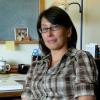
Contact Kimberly
Kimberly Chang
413.549.4600

Kimberly Chang
413.549.4600
Kimberly Chang, associate professor emerita of cultural psychology and creative nonfiction, holds a B.A. in psychology from William Smith College, and an M.A. in international relations, an M.S. in multicultural counseling, and a Ph.D. in social and political psychology from Syracuse University. She is an alumnus of the Juniper Summer Writing Institute and was a resident writer at the Vermont Studio Center. She publishes under the name, Q.M. Zhang, and and is the founder of MemoryWorks, a creative research and writing practice for individuals and communities seeking to reclaim histories that have been censored, buried, or erased. She is the prose editor for the Massachusetts Review.
Kim's teaching and writing sits at the intersections of anthropology and psychology, culture and self, with a focus on "Chinese" and "American" identities and communities across the Pacific. Her courses combine critical ethnography with creative writing to explore questions of identity, belonging, and citizenship for those whose lives span national borders and cultural worlds. Her current work takes creative non/fiction as the quintessential hybrid literary form for writing about migration and diaspora. Her recent book, Accomplice to Memory (Kaya Press, 2017), mixes memoir, fiction, and documentary photographs to explore the limits and possibilities of truth telling across generations and geographies.
Kim was a participating faculty member in Hampshire's China Exchange Program and the Five College Asian/Pacific/American Studies Program. She has lived and worked extensively in Hong Kong and China, and is an honorary professor at the Hong Kong Institute of Education.